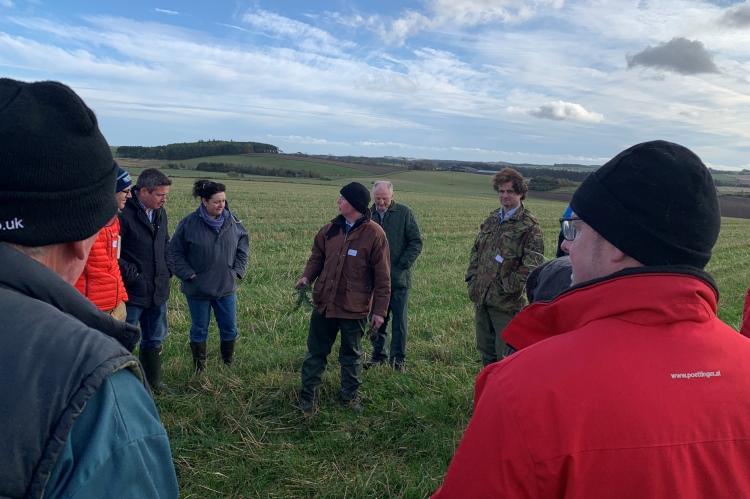Visit to Drumcarro Farm proved popular
5 November 2019A large crowd gathered for the Organic Production Farm Visit to Drumcarro Farm near St Andrews last month.
The event had been arranged to give farmers an insight into an organic business which has been farmed organically for 13 years. Hugh Gillan’s business comprises of cereals, sheep, and diversification enterprises.
Our host farmer, Hugh Gillan, gave opened the event with a background to his farm, farming systems and the history of how the business has diversified into  several different enterprises including converting to organic, renewables, livery and farm tourism in the form of both a caravan park and more recently adding a holiday cabin with hot tub.
several different enterprises including converting to organic, renewables, livery and farm tourism in the form of both a caravan park and more recently adding a holiday cabin with hot tub.
Agricultural Consultant, and meeting chairman, Hugh Ironside thanked Hugh for the introduction before giving a more detailed analysis of the farm business, showing how the decision over a decade ago to convert to organic is still helping the business remain profitable.
Hugh explained some of the crop management on-farm – including the importance of regular soil testing which ensures the farm liming plan is kept dynamic to ensure that crop production is optimised. The soil tests also help form the basis for phosphate application decisions, also aiding crop production. The transition to organic didn’t come without problems, and Hugh explained some of the issues that Drumcarro faced and how these were mitigated.
Being a mixed enterprise farm, the role of crop rotation is an important one to ensure both crop vigour and to provide fodder for the breeding sheep flock. Hugh Ironside provided information on how to ensure successful grass establishment on reseeds, including weed control, with particular reference to dock control. Once established, docks in a grass sward can dramatically reduce the grass cover and if allowed to grow to seed, can provide a stubborn soil seed bank which can persist for a long period of time.
SRUC’s researcher & lecturer in Crop Protection, Henry Creissen then gave a very informative presentation on crop rotations, disease and pest control, discussing in  great depth the best ways to try and reduce pests by making best uses of rotations and machinery; for example, saline traps are used at Drumcarro to detect the presence of leather jackets in the winter wheat and machinery is selected to efficiently reduce the impact of weeds and pests within the crops. Later in the day, Henry discussed the benefits of growing ‘green covers’ not only to help reduce both soil and Nitrogen losses but to improve soil organic content. Increasing soil organic matter can help improve soil structure to reduce soil compaction problems, aid water drainage in a field and increase soil biological health. There is more information about the benefits of cover crops on our Soils webpage.
great depth the best ways to try and reduce pests by making best uses of rotations and machinery; for example, saline traps are used at Drumcarro to detect the presence of leather jackets in the winter wheat and machinery is selected to efficiently reduce the impact of weeds and pests within the crops. Later in the day, Henry discussed the benefits of growing ‘green covers’ not only to help reduce both soil and Nitrogen losses but to improve soil organic content. Increasing soil organic matter can help improve soil structure to reduce soil compaction problems, aid water drainage in a field and increase soil biological health. There is more information about the benefits of cover crops on our Soils webpage.
Following on from Henry, the next guest speaker, Roger Baird, Director a WN Lindsay (independent grain merchants) presented an update on the current cereal market. Given that the organic cereal market in the UK is only 2% of the total cereal market, even a small oversupply can greatly reduce the price. Roger stressed the importance of growing varieties of malting barley to match the market demand; the varieties chosen should have good disease resistance e.g. Chronicle, Concerto and Laurette. Finally, Roger explained how currently there is a good demand for organic oats for the porridge market, but not for livestock feeding. Roger then gave the group a brief insight into the grain outlook as it stands, for next year – no easy task with the current political difficulties that lie ahead!
Finally, the group got a guided tour around some of Drumcarro and host Hugh spoke about the management of his breeding sheep flock, including his organic veterinary plan, his breeding decisions and how he efficiently fattens the lambs.
If you would like more information about organic production, or farm diversification, please contact us using the FAS Advice helpline number (0300 323 0161), or by emailing us at advice@fas.scot
Our next organic event is being held on Tuesday 19 November at the Craibstone Estate where the main topic for the day will be how to market organic food and drink successfully. Find the full details at NE Organic Discussion Group 2019 Meeting 3 (Aberdeen)
Sign up to the FAS newsletter
Receive updates on news, events and publications from Scotland’s Farm Advisory Service

